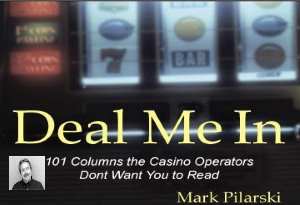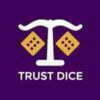On a certain 25¢ video poker machine that I like to play, the machine allows me to double up what I’ve just won by picking high or low against a pair of rolling dice. This really can’t be a good bet, right? Nancy R.
For those of you who don’t know it, some video poker machines offer you the option of risking your current winning hand for a chance at doubling your money. Though it can be high/low against a machine-dealt playing card, in Nancy’s case, it’s against a simulated dice roll (2-6 under, 7 push, 8-12 over).
At first glance, Nancy, many players believe this is just another way for the casino to pillage your purse. Not so, my friend. It ‘s actually one of the best bets in the casino. No house edge means a 50-50 chance of you doubling your money. Sound too good to be true? Yes and no.
Though each decision has exactly a 50-50 chance, the odds of winning more than one in a row will decline sharply. Experts are divided on whether you’re gambling on individual rolls or a sequence of rolls (myself in the latter category), but either way, the bet is heavily stacked against you if your goal is to string 10 wins together. Also, don’t plan on doubling as often as you wish. We all think of the possibilities, Nancy, like winning 19 hands in a row with a $2.50 investment and becoming an instant millionaire. Unfortunately, just like the table games where table limits apply, the compounding of money by parlaying winnings won’t work here either. Machines limit the doubling from as little as five times in a row to 10,000 coins returned ($2,500).
So the long and short of it, Nancy, is to show some strong money management (cash control) and play this wager without going overboard.
I was on the Internet looking for information on casino gambling for a school project. My topic is called “Should the United States Promote Casino Gambling?” I found your column called “Covering All the Bases” very helpful. I was wondering if you had any other material that might help. Lynne T.
Because of limited space, Lynne, allow me to temporarily stand neutral on the proliferation of gambling across America and the government’s active participation in it. For those who want a phenomenal research treatise on your legislature’s relationships with the gambling industry, look to Robert Goodman’s book The Luck Business, subtitled, “The Devastating Consequences and Broken Promises of America’s Gambling Explosion.”
Besides your school project, I would highly recommend this solid study to all government policymakers and voters alike who will decide in the future whether the fastest growing industry in the nation (gambling) belongs in their neighborhood.
With half of America now living within two hours of casino gambling, it’s sooner than you think.
Recently I was on a crap game where the dice were rolling numbers for eight hours. Not non-stop, but it was a player’s game and I just couldn’t leave. Good thing I didn’t. I bought in for $100, played just like you recommended (pass line bets with odds, placing the 6 and 8), and walked out eight hours later with $3,400. I thought your readers might appreciate that every now and then, even the small-time player, has a night worth remembering. Clark D.
Bosses give you the heave-ho, relatives disown you, friends forget you, but an unbelievable night on a crap game, ah, that lasts forever. Thanks for sharing, Clark.




















